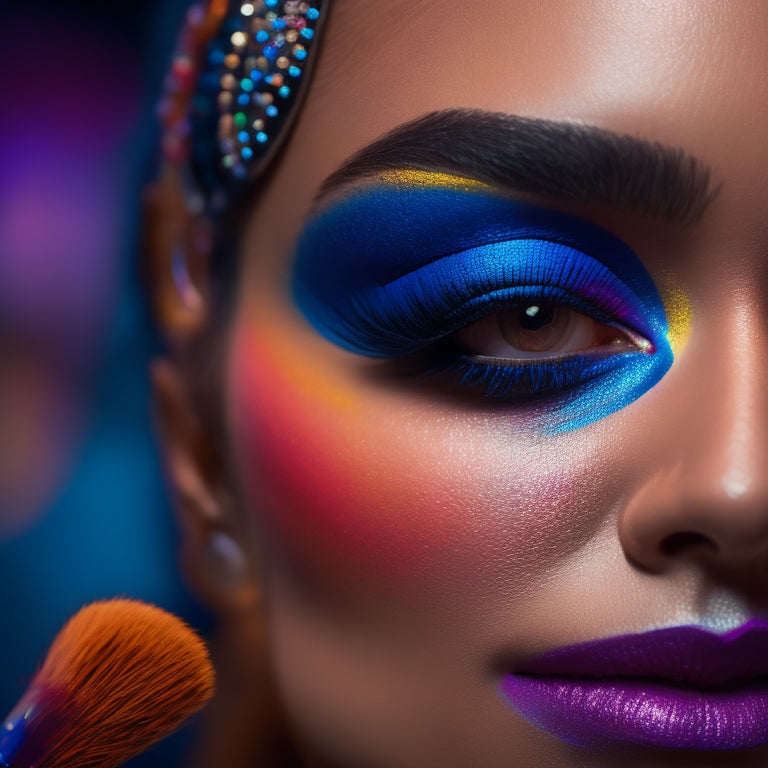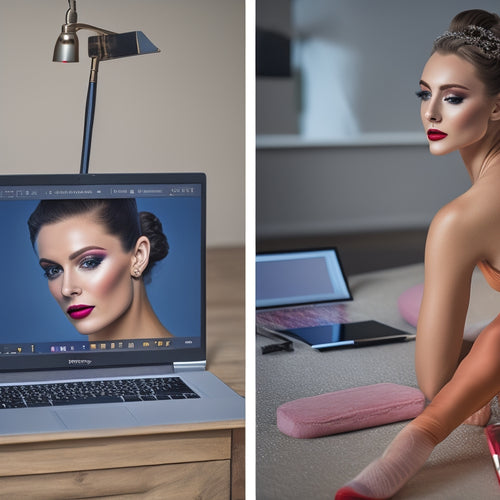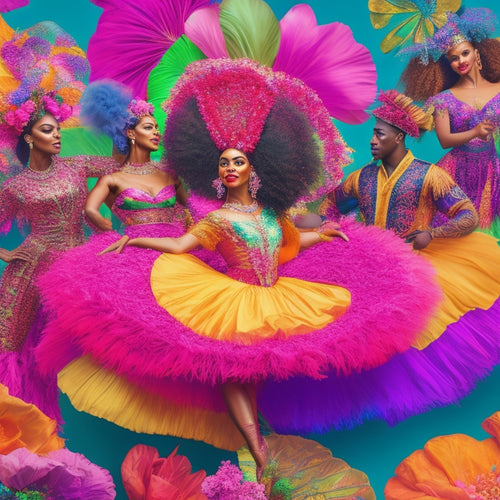
7 Essential Training Secrets for Dance Makeup Artists
Share
You're about to discover the secrets to transforming your dance makeup artistry into a thriving online business, where digital skills meet creative flair. Master digital makeup techniques with Virtual Try On technology and Digital Skin for realistic textures. Build your online presence fast with a professional website and consistent brand identity. Create engaging course content with visual storytelling and interactive elements. Set up online course platforms that fit your teaching style and goals. Market to targeted audiences by identifying ideal clients and crafting compelling messages. By mastering these essentials, you'll be well on your way to scaling your digital makeup business - and that's just the beginning.
Key Takeaways
• Master digital makeup techniques to enhance dance performances with Virtual Try On technology and realistic Digital Skin textures.
• Develop a strong online presence through a professional website and consistent brand identity to attract dance clients.
• Create engaging online course content with clear objectives, visual storytelling, and interactive elements to educate dance makeup artists.
• Utilize user-friendly online course platforms with seamless payment gateways and marketing tools to reach a targeted dance audience.
• Craft compelling marketing messages and leverage social platforms strategically to reach ideal dance clients and address their pain points.
Mastering Digital Makeup Techniques
To enhance your dance makeup artistry, begin by acquainting yourself with digital makeup techniques, as they can significantly broaden your creative possibilities. You'll be amazed at how Virtual Try On technology can transform your workflow. This innovative tool allows clients to visualize how different makeup looks would appear on their digital skin, eliminating the need for physical makeup applications. By mastering Virtual Try On, you'll reduce the time spent on trial and error, and increase client satisfaction.
As you explore further into digital makeup techniques, you'll uncover the boundless possibilities of Digital Skin. This state-of-the-art technology enables you to create highly realistic, customizable skin tones and textures. With Digital Skin, you can experiment with various makeup looks, test products, and even create personalized designs tailored to each client's unique features. By mastering Digital Skin, you'll access new levels of creativity and precision, distinguishing yourself as a cutting-edge dance makeup artist.
Building Online Presence Fast
As a dance makeup artist, you're only a few clicks away from establishing a strong online presence that showcases your artistry and attracts potential clients.
Building an online persona is vital in today's digital age, and it's imperative to fast track your online presence to stay ahead of the competition.
Start by claiming your online real estate - register your domain name and secure your social media handles. Create a professional website that showcases your portfolio, services, and testimonials. Guarantee consistency across all platforms by using a uniform brand identity, including a logo, color scheme, and typography.
Next, focus on developing a strong online persona that resonates with your target audience. Share behind-the-scenes content, tutorials, and tips that provide value to your followers. Engage with your audience by responding to comments and direct messages.
By expediting your online presence, you'll increase your visibility, credibility, and ultimately, attract more clients.
Creating Engaging Course Content
By crafting course content that's both informative and entertaining, you'll captivate your students and set yourself apart as a dance makeup artist who's not only skilled with a brush, but also adept at teaching.
To create engaging course content, you need a solid content strategy that aligns with your learning outcomes. Here are three essential elements to include:
-
Clear Objectives: Define what students will achieve from your course, and guarantee your content is structured to meet those objectives.
-
Visual Storytelling: Use high-quality images, videos, and tutorials to demonstrate makeup techniques, making it easier for students to follow along and learn.
-
Interactive Elements: Incorporate quizzes, discussions, and hands-on exercises to keep students engaged and motivated throughout the course.
Setting Up Online Course Platforms
You'll need a solid online course platform to host your engaging content, so let's explore the top options for setting up your virtual classroom. As a dance makeup artist, you want to focus on teaching, not tech troubles. Popular platforms like Thinkific, Teachable, and Kajabi offer user-friendly interfaces and customizable course formats to suit your needs. You can create video-based lessons, downloadable resources, and interactive quizzes to keep students engaged.
When selecting a platform, consider the payment gateways they integrate with, such as Stripe, PayPal, or Authorize.net. You'll want to guarantee seamless transactions for your students and easy payout options for yourself. Some platforms also offer built-in marketing tools, like email marketing and affiliate management, to help you promote your course.
Ultimately, choose a platform that aligns with your teaching style and goals. With the right platform, you'll be free to focus on what matters most – sharing your expertise with aspiring dance makeup artists and helping them shine.
Marketing to Targeted Audiences
As a dance makeup artist, you're about to reveal the secrets of targeting the right audience with your marketing efforts. To get started, you'll need to pinpoint your ideal clients, craft messages that resonate with them, and leverage social platforms to reach them where they're most active.
Identify Ideal Clients
To maximize your marketing efforts, pinpointing your ideal client - a specific type of dance company, instructor, or performer - is essential, as it allows you to tailor your services and messaging to their unique needs and preferences. By identifying your ideal client, you can create targeted marketing campaigns that resonate with them, increasing the likelihood of attracting and retaining clients who value your services.
To get started, consider the following steps to identify your ideal client:
-
Define your target demographics: What type of dance companies, instructors, or performers do you want to work with? Consider factors such as age, location, and level of experience.
-
Develop client personas: Create detailed profiles of your ideal clients, including their goals, challenges, and motivations. This will help you understand their needs and preferences.
-
Research their pain points: Identify the specific challenges your ideal clients face, and how your services can help solve them.
Craft Compelling Messages
With your ideal client in mind, now craft messages that speak directly to their needs, resonating with their goals and pain points to build a strong connection and establish your credibility as a dance makeup artist. You've got a deep understanding of their struggles and aspirations, so use that insight to craft compelling messages that resonate deeply.
Develop a brand voice that's authentic, empathetic, and empowering, conveying your unique perspective and expertise. Through storytelling, share relatable anecdotes, client success stories, and behind-the-scenes glimpses into your creative process. This will help your ideal client feel seen, heard, and understood, fostering a sense of trust and loyalty.
By doing so, you'll differentiate yourself from other dance makeup artists and attract clients who appreciate your unique approach. Remember, your message should educate, inspire, and motivate – so focus on providing value, rather than just promoting your services.
Leverage Social Platforms
By strategically leveraging social platforms, you can pinpoint and target specific dance communities, reaching upwards of 80% of your ideal clients who are already active online. This allows you to establish a strong online presence, increasing your visibility and credibility as a dance makeup artist.
To maximize your social media impact, focus on the following strategies:
-
Influencer Collaborations: Partner with popular dance influencers or dance companies to showcase your work and reach a broader audience.
-
Content Calendar: Plan and schedule content in advance to maintain consistency and save time, allowing you to focus on other aspects of your business.
-
Targeted Advertising: Use social media advertising platforms to target specific demographics, interests, and behaviors, ensuring that your message reaches the right people.
Optimizing Digital Product Sales
You'll boost online sales of your digital dance makeup products by 20% or more by optimizing your product listings with high-quality visuals and detailed descriptions that showcase your expertise. This strategy not only helps potential customers visualize the results they can achieve with your products but also establishes your authority in the dance makeup industry.
To take it to the next level, implement effective e-commerce strategies by creating sales funnels that guide customers through the buying process. This includes crafting compelling product titles, descriptions, and calls-to-action that resonate with your target audience. By streamlining the customer journey, you'll increase conversions and drive revenue growth.
Additionally, consider offering limited-time discounts, bundle deals, or loyalty programs to incentivize repeat business and foster brand loyalty. By optimizing your digital product sales, you'll be well on your way to building a thriving online business that empowers dance makeup artists worldwide.
Scaling Digital Makeup Business
As you scale your digital makeup business, you'll need to establish a strong online presence that showcases your unique style and expertise.
By identifying specific niche markets, such as dance competitions or theatrical performances, you can tailor your services to meet the distinct needs of these clients.
Building Online Presence
Establishing a strong online presence is essential in today's digital age, and for dance makeup artists, it's imperative to scale their digital business by creating a professional website that showcases their artistry and services. You want to make sure that your website accurately reflects your brand identity, making it easily recognizable to potential clients.
To optimize your website, focus on the following key areas:
-
Fast Loading Speed: A slow website can lead to high bounce rates and a poor user experience. Guarantee that your website loads quickly, even on mobile devices.
-
Mobile-Friendliness: With most users accessing the web through their smartphones, it's important that your website is optimized for mobile devices.
-
SEO-Friendly Content: Create content that's not only engaging but also optimized for search engines, increasing your visibility and chances of attracting potential clients.
Identifying Niche Markets
By exploring specific niches within the dance industry, such as ballet, hip-hop, or ballroom, you can tailor your makeup services to cater to their unique needs and preferences, ultimately setting yourself apart from competitors.
This targeted approach allows you to identify niche segments within the dance industry that align with your skills and interests. For instance, you might specialize in creating dramatic, bold looks for hip-hop dancers or emphasize natural, elegant styles for ballerinas.
By focusing on these specific niches, you'll be better equipped to address market gaps and capitalize on untapped opportunities.
As you investigate further into these niches, you'll develop a deeper understanding of the specific challenges and requirements of each group, enabling you to craft bespoke solutions that meet their distinct needs.
Diversifying Income Streams
You can further solidify your reputation as a dance makeup expert by creating multiple revenue streams that generate income beyond one-on-one makeup services, allowing you to scale your digital business and amplify your earnings. By diversifying your income streams, you'll reduce your reliance on a single source of income and create a more sustainable business model.
Here are three ways to diversify your income streams:
-
Insurance options: Offer specialized insurance options for dancers, such as equipment insurance or liability insurance, and earn a commission for each policy sold.
-
Digital products: Create and sell digital products, like online courses, eBooks, or tutorials, that cater to the dance community and provide valuable information on makeup techniques and best practices.
-
Royalty streams: License your makeup designs or techniques to dance companies or events, and earn royalties for each use.
Frequently Asked Questions
What Is the Ideal Camera Equipment for Makeup Tutorials?
When filming makeup tutorials, you'll need a camera that captures crisp, high-definition footage, like a Canon EOS 80D. Consider investing in a camera with adjustable Lighting Essentials and experiment with Camera Angles to create visually appealing content.
Can I Use Royalty-Free Music in My Online Courses?
When developing online courses, you'll want to make sure you're using royalty-free music to avoid copyright issues. Explore Music Licenses and diverse Audio Options, and you'll find the perfect tracks to elevate your content without worrying about legal hassles.
How Do I Protect My Digital Products From Piracy?
To safeguard your digital products from piracy, you'll want to employ watermarking strategies, such as visible or invisible stamps, and encryption methods like AES or PGP, to guarantee your valuable content remains secure and protected.
What Are the Best File Formats for Online Course Videos?
"When creating online course videos, you'll want to prioritize video compression to reduce file size, consider file conversion to MP4 or WebM for compatibility, and opt for a 16:9 aspect ratio for a cinematic feel, perfect for screen recording tutorials."
Do I Need a Business License to Sell Digital Makeup Products?
"Imagine your digital makeup empire crumbling like a poorly set cat eye, all because you neglected to get a business license. Don't risk it! You're not just a makeup magician, you're a business owner - so, yes, you need a license to operate legally and maintain a solid business structure, ensuring legal compliance."
Related Posts
-

10 Online Makeup Tutorials for Ballet Dancers
You're about to discover a range of makeup techniques specifically designed to enhance your ballet performances, from...
-

Elder Hall Hosts Bird Dance Extravaganza
On March 1, 2024, Elder Hall will come alive with the 'Dancing with the Birds' event, a mesmerizing fusion of music, ...
-

Dance Dress Code: Unleash Your Style
A dance dress code that prioritizes functionality and technical precision can often stifle dancers' ability to expres...


